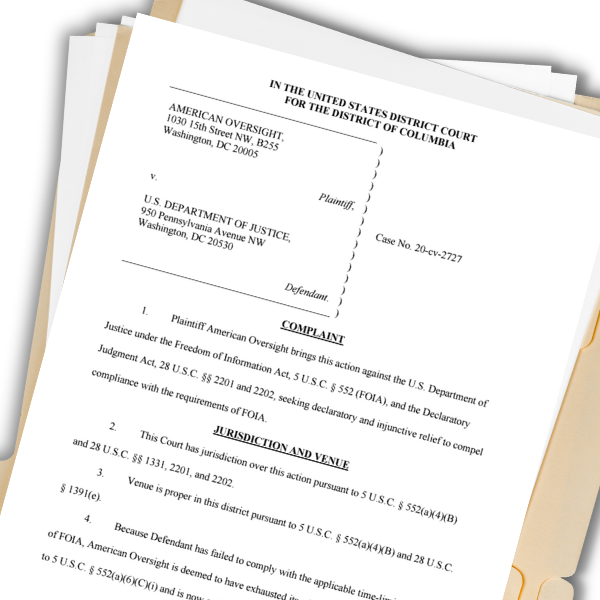
American Oversight Sues for Records About Justice Kennedy’s Replacement Preferences
The records could shed light on politicization of the Supreme Court nomination process.

American Oversight filed suit against the Department of Justice on Thursday seeking records related to former Supreme Court Justice Anthony Kennedy’s preferences for his replacement when he resigned in 2018. The records could shed light on the potential political power plays involved in nominations to the nation’s highest court at a time when that process is more important than ever.
American Oversight first filed Freedom of Information Act requests in July 2018 for communications between the Justice Department’s Office of Legal Policy and certain external parties, including Supreme Court justices, “concerning potential, actual, or suggested nominations to the Supreme Court.” As Exhibit A in our suit shows, the Justice Department initially told us they discovered “a small amount of material” but then ultimately determined it wasn’t responsive to our request because it involved the representations of other third parties, rather than the explicitly cited external entities in American’s Oversight’s initial inquiry.
In January of this year, we filed two more narrow requests, one specifically targeting the documents the Justice Department deemed unresponsive and another more broadly requesting “any document intended to convey individuals that former Supreme Court Justice Anthony Kennedy preferred or recommended be nominated to the Supreme Court.”
But the department still hasn’t produced this limited information, more than eight months later — despite presumably already knowing at least the specific record’s location, having uncovered it in response to our earlier request.
While the exact content of the records will remain unclear until they are released, the existence of communications involving such nominee recommendations may raise questions about whether Kennedy had a practical conflict of interest in seeking to influence who would replace him at the same time the Supreme Court was weighing issues directly involving the Trump administration, including the travel ban.
Exposing the dynamics at play between the administration and the members of the Supreme Court is especially important now that another seat is vacant after the passing of Justice Ruth Bader Ginsburg. The public has a right to know as much as possible about how previous openings on the court were filled.